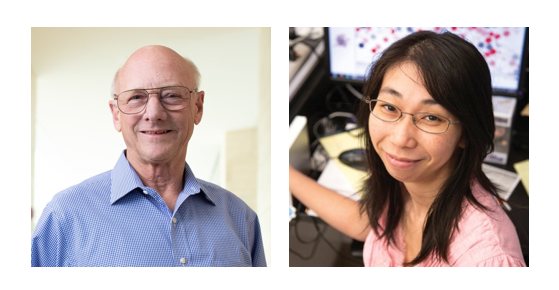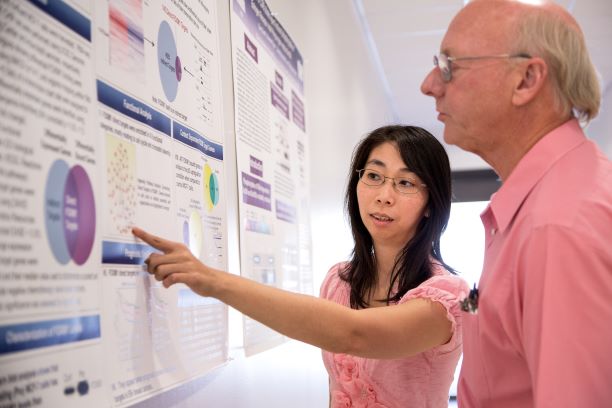by Buck Institute
June 24, 2020 . News
Buck professors receive a prestigious award from the American Association of Cancer Research
 Buck Institute Professor and founding faculty member, Dr. Christopher Benz, and Adjunct Assistant Professor, Dr. Christina Yau, were among 130 US and Canadian scientists awarded the prestigious Science Team Award from the American Association for Cancer Research (AACR) for 2020. AACR and Eli Lilly started this award in 2007 to acknowledge and catalyze the growing importance of interdisciplinary team science to better understand the complexities of cancer and facilitate the translation of basic research discoveries into clinical applications. Evaluating cancer science efforts worldwide, this award selects and recognizes one outstanding interdisciplinary team of researchers for their innovative and meritorious accomplishments.
Buck Institute Professor and founding faculty member, Dr. Christopher Benz, and Adjunct Assistant Professor, Dr. Christina Yau, were among 130 US and Canadian scientists awarded the prestigious Science Team Award from the American Association for Cancer Research (AACR) for 2020. AACR and Eli Lilly started this award in 2007 to acknowledge and catalyze the growing importance of interdisciplinary team science to better understand the complexities of cancer and facilitate the translation of basic research discoveries into clinical applications. Evaluating cancer science efforts worldwide, this award selects and recognizes one outstanding interdisciplinary team of researchers for their innovative and meritorious accomplishments.
This year, the award celebrates The Cancer Genome Atlas (TCGA) program, an ambitious project jointly funded by the National Cancer Institute and the National Human Genome Research Institute, in order to obtain a deeper and more comprehensive understanding of the genomic alterations that underlie all major cancers. Originally envisioned by NCI and NIH leaders and then launched as a pilot project in 2006, TCGA has since completed multi-omic studies on nearly 20,000 human tumors across 33 different cancer types, generating a totally new molecular understanding of cancer at the DNA, RNA and protein levels. It has produced a treasure trove of “Big Data”, and has made publicly available all its genomic, epigenomic, transcriptomic, and proteomic data and analyses. “Helping guide 12 years of TCGA projects while also working alongside so many internationally renown cancer scientists has been an exciting and stimulating privilege, as well as a career-capping opportunity to transformatively help redefine our understanding of human cancers,” says Benz. “Sharing with scientists worldwide all our TCGA-derived data and analyses leaves an immensely valuable legacy and resource for future cancer studies, of which I’m very proud. Working with TCGA team scientists has been an incredible opportunity to help uncover so many new molecular mechanisms that drive different cancer types, mechanisms that can now be therapeutically targeted to improve and personalize treatments for all cancer patients.”
“This award from the AACR is much-deserved recognition for Chris’ and Christina’s phenomenal work as part of The Cancer Genome Atlas.” said Eric Verdin, MD, Buck Institute CEO and President. “Chris has been a leading voice in connecting aging to cancer and has played a driving role in so many foundational projects. His lab’s work continues to push the boundaries of our understanding of breast cancer while retaining a focus on making patients' lives better.”
 Drs. Benz and Yau are primarily breast cancer translational scientists, Benz at the Buck and Yau at UC San Francisco, with an adjunct appointment at the Buck. Dr. Benz is also a clinician and UCSF faculty member, seeing patients weekly at the Carol Franc Buck Breast Care Center and working alongside a multi-specialty team of clinical breast oncologists. Benz and Yau, together with a team of computer scientists and bioinformaticians at UC Santa Cruz, have run one of the country’s Genome Data Analysis Centers (GDACs) associated with TCGA since 2008. In addition to co-authoring their studies of breast and other cancers in a 12 year series of high impact TCGA publications, their GDAC team has also led a worldwide Pan-Cancer effort within the TCGA that proposed a new taxonomic classification of all human cancers based not only on the cancer’s original tissue site of origin, but rather its fundamental cell-type of origin. This work helps explain why patients diagnosed with the same tissue type of cancer often respond differently to similar cancer treatments, and propels emerging clinical efforts to better personalize cancer treatments. Two years ago Benz and Yau were both primary authors on an overview of one of TCGA’s culminating achievements, the Pan-Cancer Atlas. This Atlas is actually a collection of many simultaneously published studies in April 2018, offering a detailed and comprehensive molecular view of tumorigenesis organized under three basic themes (cell of origin patterns, common oncogenic processes, disrupted cell signaling pathways) and providing new guidance for future cancer treatment studies and clinical paradigms.
Drs. Benz and Yau are primarily breast cancer translational scientists, Benz at the Buck and Yau at UC San Francisco, with an adjunct appointment at the Buck. Dr. Benz is also a clinician and UCSF faculty member, seeing patients weekly at the Carol Franc Buck Breast Care Center and working alongside a multi-specialty team of clinical breast oncologists. Benz and Yau, together with a team of computer scientists and bioinformaticians at UC Santa Cruz, have run one of the country’s Genome Data Analysis Centers (GDACs) associated with TCGA since 2008. In addition to co-authoring their studies of breast and other cancers in a 12 year series of high impact TCGA publications, their GDAC team has also led a worldwide Pan-Cancer effort within the TCGA that proposed a new taxonomic classification of all human cancers based not only on the cancer’s original tissue site of origin, but rather its fundamental cell-type of origin. This work helps explain why patients diagnosed with the same tissue type of cancer often respond differently to similar cancer treatments, and propels emerging clinical efforts to better personalize cancer treatments. Two years ago Benz and Yau were both primary authors on an overview of one of TCGA’s culminating achievements, the Pan-Cancer Atlas. This Atlas is actually a collection of many simultaneously published studies in April 2018, offering a detailed and comprehensive molecular view of tumorigenesis organized under three basic themes (cell of origin patterns, common oncogenic processes, disrupted cell signaling pathways) and providing new guidance for future cancer treatment studies and clinical paradigms. Science is showing that while chronological aging is inevitable, biological aging is malleable. There's a part of it that you can fight, and we are getting closer and closer to winning that fight.
Eric Verdin, MD, Buck Institute President and CEO